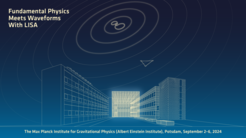Preparing the ground for a space detector
Experts meet at the Max Planck Institute for Gravitational Physics
In early 2024, the European Space Agency adopted the first gravitational-wave observatory in space called LISA, which is scheduled for launch in 2034. The strength, number, and nature of the signals observed by LISA will significantly differ from those detected by ground-based detectors, opening up a whole new part of the gravitational-wave spectrum. This poses many challenges for the scientists, who must now prepare the theoretical and data-analysis tools that will allow them to take full advantage of LISA’s capabilities. To discuss these tools, about 140 researchers will attend the workshop “Fundamental Physics Meets Waveforms with LISA” at the Max Planck Institute for Gravitational Physics (Albert Einstein Institute, AEI) in the Potsdam Science Park from September 2 to 6, 2024.

LISA will detect gravitational radiation in the yet unexplored window between 0.1 mHz and 0.1 Hz. In this range, which cannot be observed from Earth, the Universe contains a variety of strong gravitational-wave sources: binary systems of massive black holes, small black holes orbiting and plunging into more massive black holes, and close binary stars in our Milky Way. LISA will be able to detect binary systems of black holes with stellar masses many years before they merge. A stochastic gravitational-wave background and possibly entirely new and unexpected sources are also on the list of potential future discoveries.
New sources in sight – new tools needed
To fully exploit LISA's capabilities, accurate and efficient predictions of gravitational waveforms of the new sources are essential. In addition, novel computational methods and machine-learning techniques are needed for highly effective and precise LISA parameter inference.
The workshop brings together the LISA Consortium's Fundamental Physics and Waveform Working Groups to:
- discuss the theoretical developments and data-analysis tools needed to perform strong-field tests of General Relativity with LISA and probe the nature of black holes,
- identify significant waveform developments for different gravitational-wave sources needed for LISA data validation and scientific exploitation.
The workshop will be hosted by the Department of Astrophysical and Cosmological Relativity at the AEI in Potsdam, which is playing a key role in preparing for LISA science exploitation.












